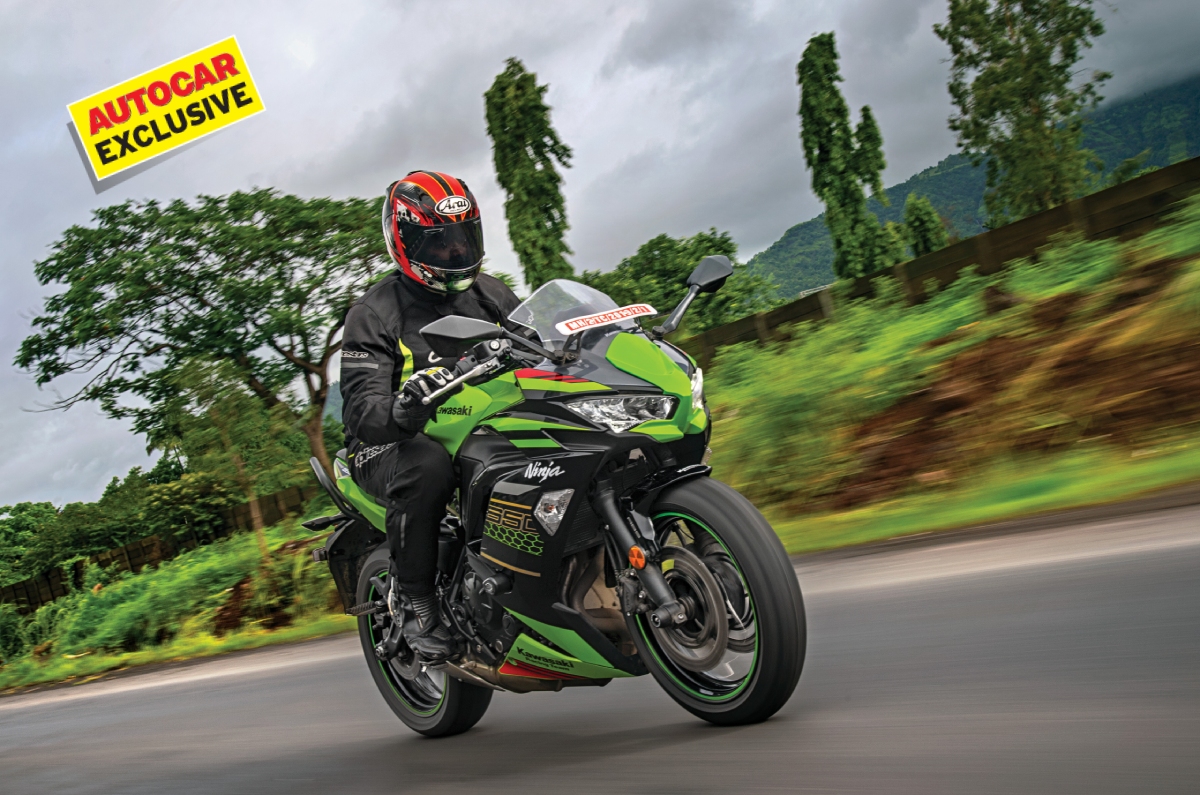
Over the last few years, the Kawasaki Ninja 650 has established itself as a great choice for those stepping up from a single-cylinder machine to middleweight motorcycles. It remains one of the most beginnerfriendly 650cc machines around, and now, with this BS6 upgrade, it promises to be even more desirable. We borrowed this motorcycle from Anzen Kawasaki, Mumbai, to see just how much has changed.
What’s new?
Let me come straight to the point, I was never a fan of the previous Ninja 650 designs. It did nothing to tingle my visual senses, although the 2017 model, with its smaller dimensions and sleeker design, did manage to rouse some interest. Cut to 2020, and the Ninja 650 that you see on these pages is based on the 2017 model, but it looks more appealing than ever. The visual differences between the two is mainly a new, aggressive face that has become the identity of the current Ninja family, be it the 400 or even the mighty ZX-6R. The most striking bits are the sharp twinLED headlamps and the new, raked windscreen that extends downwards to become a part of the front cowl. Together, they finally bestow a sense of aggression on this 650 platform, one that befits the Ninja name. The side fairing is also new and has the right number of cuts and creases, flowing with the rest of the design. Moving on to the rear, the cowl and the LED tail-lamp are the only visual similarities to the previous model, with the 650 getting a new pillion seat that has wider edges and more cushioning for increased comfort. Complementing the new design is its Lime Green shade and Kawasaki Racing Team (KRT) inspired stickers that do their bit to enhance its appeal.
In keeping with today’s times, Kawasaki has also updated the instrument cluster with a new 4.3- inch full-colour TFT display that also gets Bluetooth connectivity. The graphics are neat and well laid out, making it easy to read necessary information like the speed, gear position and engine revs.
Speaking of the engine, changes are limited to intake and exhaust system tweaks, to get the Ninja 650 to conform to BS6 emission norms. However, the company says they did manage to enhance the mid range, resulting in an even more responsive engine. In fact, this parallel-twin has such strong low- and mid-range grunt that I was happy slotting the slick 6-speed gearbox in higher gears and riding at a fast pace, without the engine being stressed. That’s not to say that there’s nothing left at the top; when you decide to push, the engine has enough in its arsenal to get you up to serious speeds which are on the other side of legal. This flexible nature of the engine is what primarily makes the Ninja 650 such a versatile motorcycle. However, like before, the engine doesn’t have much character. It doesn’t produce a very exciting sound and there are some vibrations felt when it’s revved out.
Once warmed up, the new Dunlop Sportmax Roadsport 2 tyres offer good grip, but they could do with better feel on a wet road.
Tried and tested
Besides these updates, Kawasaki has been wise to not tinker with the other bits that make the Ninja 650 such an easy-to-live-with, everyday sports bike. The Ninja 650’s ergonomics, for instance, are quite comfortable, thanks to the very low, 790mm seat height, the raised clip-on handlebars, and foot pegs that aren’t aggressively rear-set.
Then there’s the steel-trellis chassis that offers sufficient feedback, while the softly sprung suspension results in a supple ride over our monsoon-ravaged roads. In fact, the ride is so comfortable that you’ll barely need to roll off the throttle over most of the bad roads you’d encounter; however, you will need to watch out for deep potholes. Also, the bike scrapes quite easily over tall speed breakers, due to the low, 130mm ground clearance.
Understandably, the soft suspension setup means the Ninja 650 is good (but not great) around corners, especially when being pushed hard. In fact, for both Rishaad and I, the preload setting on our test motorcycle’s monoshock felt too soft, and that caused the rear to unsettle over mid-corner bumps. We did think of altering the setting but getting to the preload adjustment notches requires removing the side panels to access the same, making it a cumbersome process. Nevertheless, our experience with the Ninja 650 tells us that, with the correct preload setting, the motorcycle is stable at high speeds and around bends.
Mr. Dependable
To sum up, the Ninja 650 remains a capable middleweight bike and has a rock-solid reputation of reliability to bank on. It’s an easy first big bike for novices to adapt to, while remaining quick enough to keep experienced riders entertained. At Rs 6.24 lakh (ex-showroom), it carries a Rs 35,000 increment over the 2019 BS4 model, which is reasonable. With its attractive design and versatility, the new Ninja 650 is easy to recommend as an accomplished all-rounder, especially for those who aren’t looking for a highly exciting motorcycle.
from Autocar India - Bikes https://ift.tt/3fWLe81

0 comments:
Post a Comment